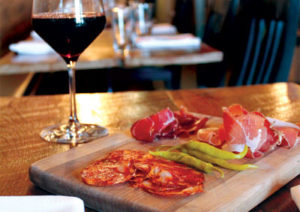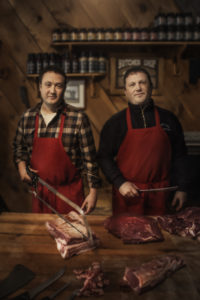February/March 2017 | view this story as a .pdf
The classic preserving methods of curing, smoking, and seasoning meat have become a world of magic for Maine butchers and chefs.
 The traditional meaning and dictionary translation of the French word charcuterie is pork butcher shop or delicatessen. In Portland, that doesn’t begin to tell the story. For a city with a widespread reputation for seafood, there is also a thriving demi-monde committed to high-quality charcuterie and salumi, much of it made with locally raised meat and poultry.
The traditional meaning and dictionary translation of the French word charcuterie is pork butcher shop or delicatessen. In Portland, that doesn’t begin to tell the story. For a city with a widespread reputation for seafood, there is also a thriving demi-monde committed to high-quality charcuterie and salumi, much of it made with locally raised meat and poultry.
MEATY FRONTIERS
“Charcuterie became trendy 10 or 15 years ago, though it’s actually a traditional art and technique, with its origins coming from preservation in the time before refrigeration,” says Pete Sueltenfuss, owner of the Other Side Delicatessen on Portland’s Veranda Street.
“Nowadays, charcuterie isn’t really limited to just cured meats like ham and bacon. It includes other things like fresh, uncured sausage and pâté, beef, and poultry livers.”
“Other things” are a specialty at the Other Side, depending on what fresh local livestock catches his fancy. A self-taught charcutier, Sueltenfuss got his start in the curing and smoking arts through “trial and error. Then I worked in Boston as sous-chef to Jamie Bissonnette [executive chef of the renowned restaurant Eastern Standard on Commonwealth Avenue], and I learned a lot from him.” Subsequently, Sueltenfuss (pictured above right) moved to Portland to work at Fore Street, Miyake, and ultimately at Grace, where he was executive chef. He left to open the Other Side in early 2015 and will soon add a second location on Vaughan Street in the West End at the site of the old Vaughan Street Variety.
In his small, open deli kitchen, he accomplishes many things, including sometimes breaking down whole animals into assorted cuts. He dry-ages beef and lamb, and he makes fresh Italian sausages and delicious chicken Florentine links flavored with mozzarella, Parmesan, spinach, garlic, and lemon. He smokes chicken and bacon in a little smoker right next to his hulking range and pizza oven and cures his own pancetta (pork belly seasoned with garlic and rosemary) and coppa. “Coppa is dry-cured ham, basically, but from the shoulder.” It’s dark and marbled, sliced tissue-thin, with an earthy, salty flavor that’s perfect with an aperitivo. These cured items are sliced to order rather than packaged, which is perfect for experimenting with a few slices of this and that to discover what you like.
If that weren’t enough, there are his house-made pâtés. He uses Commonwealth Farm chicken livers for silky terrines, Hudson Valley duck livers for his foie gras terrine, and pork he sources from Maine farms including North Star in Windham and Winter Hill in Freeport for his addictive pistachio-studded country pork pâté. “We flavor it with warm spices like nutmeg and allspice.
“Fresh sausage is a great seller for us. We offer things that people may have not had before, like duck rillettes, that they’ll come back for. Whenever we get whole animals, we’ll do a terrine that’s based on all the offal–innards and organ meat. That can be tough to get people to try, but once they do it’s pretty successful.”
He’s a charcutier who responds to what’s available. “We had really beautiful veal terrine at the holidays and rabbit terrine when we can get rabbits from North Star Farm in Windham.” Since the Other Side also offers ready-to-reheat dinners, the rabbits also turned up in a rabbit stew with gnocchi.
VIVE LA TOURTIèRE

Photo by Filipp Kotsishevskiy
Nothing holds its own in the fickle world of food trends quite like tradition. “We’re still pretty small-batch, so we can keep the consistency and quality,” says Marc Mailhot, who has run the E.W. Mailhot Sausage Company in Lewiston for the past 20 years. Find Mailhot’s classic Franco-American sausages, pork tourtière, salmon pies, and cretons spreads in many groceries including the butcher section at Hannaford. The company opened in 1910, and “we just keep making what we make,” says Mailhot. The trendiest thing the company ever did was come out with lower-fat turkey cretons in addition to the standard pork version, and that was 25 years ago.
“I’ve got a little one still in school, but if he [joins the company], he’ll be the fifth generation of Mailhots.”
In the search for sausage tradition, it’s hard to beat the selection at Pat’s Meat Market, the neighborhood butcher/grocery/deli on Stevens Avenue. “We make sausages every day,” says Hugh Topchick, one of the market’s many personable butchers. “We have to keep up–they’re really popular.” He’s standing behind a glass case filled with bins of chorizo, sweet and hot Italian, chicken pesto, chicken Sicilian, Buffalo, Caribbean bangers, and Lithuanian kielbasa links. You’ll discover how hard it is to choose.
OVER THE BRIDGE
“We make all our own sausages. All of the meat here [among them delicious cuts of beef, lamb, pork, and chicken] is from Maine,” says Logan Higger, standing behind the dazzling butcher counter at The Farm Stand on Ocean Street in South Portland’s Knightville neighborhood. The Farm Stand is a “produce/butcher/kitchen/deli/wine” collaboration between Farmer’s Gate butcher shop in Wales, owned by Ben Slayton and his wife Erin Cinelli, and Jordan’s Farm in Cape Elizabeth, so there are plenty of fresh vegetables, too. If you can’t find something really wonderful to make for dinner here, you just aren’t trying. Even if you don’t cook much, there are prepared soups and stews to take home and heat up.
“I apprenticed with a butcher in Boston, and I’ve been here and at the shop in Wales [Maine, near Lewiston] a couple of years,” says Higger. His enthusiasm is catchy as he directs us to the lengthy chalkboard list of sausages of their own recipes, among them a German bratwurst, Red Belly, Toulouse, Tuscan, Angry Tuscan, Coco Mole, Buffalo Blue, Hot Chili, and Moroccan. We take home the Viking, which turns out to be a keeper, mild pork with a subtle whisper of clove–it’s a real star with buttered egg noodles.
DELI DELUXE
Try this,” says Polly Wanzer, offering a tissue-thin sliver of Rosemary ham from behind the deli counter at the flagship Rosemont Market on Brighton Avenue. It’s delicately herby. “Now try this.” She proffers another pink sliver, this time of Rosemont-Smoked ham. It’s fantastic, redolent of slow smoking over coals, made of organic pork from Common Sense Farm in Unity.
“People make up their own charcuterie platters at home,” she says, often because they’ve enjoyed them in restaurants. “And they make sandwiches and pizza, or maybe they just want to nibble on some good-quality prosciutto with a glass of wine.”
The Rosemont also smokes its own turkey and bacon. And at the adjacent butcher counter, fresh sausages are displayed next to cuts of natural, hormone-free beef, lamb, pork, and chicken, all from Maine.
“Sujuk is probably our most popular sausage,” says butcher Carlos Tirado. “It’s got an Eastern Mediterranean, sort of Armenian, flavor profile with fennel, fenugreek, allspice, cumin, cayenne, and paprika.” There’s spiced and smoked tasso ham “for your Cajun jambalayas and dirty rice.”
“We often make local duck and chicken liver pâtés,” says Tirado. “But some chefs in town make their own pâtés, too, and they buy up a lot of what’s available from the local natural and organic poultry farmers. Guy [Hernandez at Lolita] and Ben [Jackson at Drifter’s Wife] are perennial chicken-liver buyers.”
VARIETY, THE SPICE OF LIFE
We head up Munjoy Hill to the warmth of the crackling open cook-fire at Lolita, a well-known destination for exotic charcuterie, for further research.
“Everyone loves Iberico de Bellota,” says bartender Matthew Irving. “It’s the famous Spanish ham made from pigs that are fed acorns. And speck is pretty popular because it’s accessible.” Less well-known is the Violino di Capra, goat ham so named for the traditional way the chef would tuck one end of the whole leg under his chin to shave off slivers, as if playing a violin. “It’s wine-cured and has a hint of juniper. Probably a third or more of the bar-snacking people do here is charcuterie and salumi.” The list is rounded out with crespone (a Northern Italian salami), bresaola (air-dried, salted beef), and coppa.
“The thing about this selection,” says chef Guy Hernandez, who owns Lolita with his wife Stella, “is you could close your eyes and pick any three, and each will be unique. You’ll get a range of flavors and textures.”
We’re shocked to discover the wonderful chicken liver mousse–a Lolita must-have since they opened in 2014–has disappeared from the menu. “I like to move things around,” says Guy Hernandez. “Chicken livers are still on the menu, but over here in the small plates section,” grilled and served with currants, saffron, and a side of wilted spinach. “I just made a pork terrine with apple and hazelnut because I had this great piece of pork. We’ll have that on special this week.”
When I tell him I’ve been talking to Pete Sueltenfuss at the Other Side, who also finds success–and fulfillment–in varying his offerings, Hernandez laughs. “Pete’s old school, too. The kind of guy who likes to take the approach that this is what I have; here is this piece of meat. Now what can I do with it?”
We’re all for the quest.





0 Comments